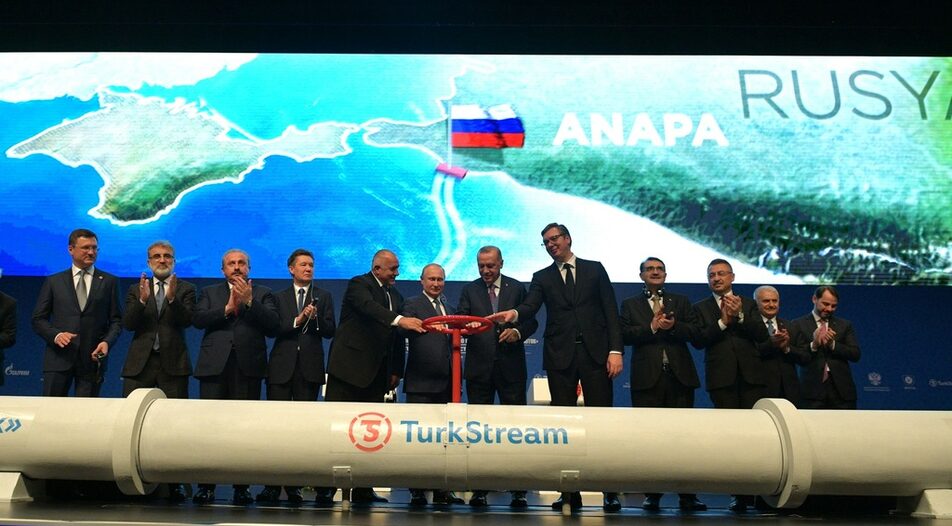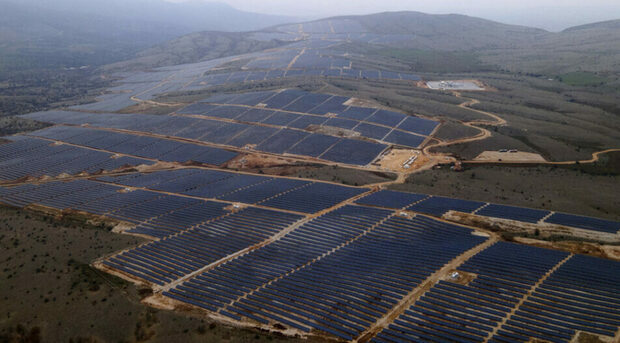Sooner or later the truth comes out. It seems that this applies all over again with the Turkstream gas pipeline crossing through Bulgaria, which was built for nearly 3 billion levs in the period 2018-2020, during the last government of GERB.
The project was presented by then-Prime Minister Boyko Borissov as an extension of the national gas transmission network and part of the Balkan gas hub. Even then, however, there were suspicions that this was not the case at all. Now, leaked documents from the mail of Evgeni Zobnin - assistant to the Russian politician Alexander Babakov, are upholding these concerns.
The files, which were distributed by Ukrainian InformNapalm and decoded by the Bulgarian online community of cyber security and anti-disinformation experts "The Elves", show how Russia has taken control of Bulgaria's energy sector. Under pressure from Moscow, the violation of Bulgarian legislation and the neglect of national and European interests granted Russian President Vladimir Putin's wish for a gas route that bypasses Ukraine.
Various methods were considered by Russia's gas major Gazprom Export to take control of the project and Gazprombank to finance it, while retaining the formal winner of the Bulgarian tender - the Saudi Arkad consortium as the official builder. This locked Bulgaria into then returning the money to Gazprombank and paying for something that serves only the Kremlin on European soil.
The missing Roadmap for the construction of Turkstream emerged from the leaked documents. The paper was considered lost and carefully hidden by many sitting in the government. But it shows that everything about the project was pre-arranged and all procedures - capacity auctions, public procurement, changes in the energy strategy, etc. - were completely pro forma or rigged. In fact, since 2017, the Bulgarian authorities have been following the timetables in the model map which sits on the abandoned South stream project, without any real analysis of the national economic benefits from implementing the project.
Of course, it should be taken into account that these are unofficial documents from the mail of a Russian representative, which in their final version may have undergone certain changes. However, the leaks are present. They not only highlight the Bulgarian government's subservience to Russian energy interests, but the task of molding public opinion and facilitating Gazprom's propaganda PR through monthly allowances and clearly targeted conferences.
Dorozhnaya karta*
On June 3, 2017 (Saturday), the Bulgarian Minister of Energy Temenuzhka Petkova signed with Gazprom director Alexey Miller a key document for Bulgaria - a roadmap, according to which "the issue of development of the gas transmission infrastructure on the territory of Bulgaria while considering EU rules" would be studied.
On June 5, 2017 (Monday), Prime Minister Boyko Borissov told journalists that he would like the signed road map to be approved by Parliament so that Bulgaria could have a stronger position in the upcoming negotiations with Gazprom. "Otherwise, we will become just one consumer/client, and those over 5-6 billion levs investments in gas transmission systems - compressors and pipes, will not be usable," he commented at the time.
However, a vote in parliament was never taken, but Gazprom still pushed Turkstream through Bulgaria a few years later. If we trust Boyko Borissov, this happened without Bulgaria having a strong position in negotiations.
During the construction of the gas pipeline (2020-2021), the road map in question was repeatedly pointed to by various experts as the document that shows how Bulgaria capitulated to Russian interest. But the GERB government at that time refused to show it publicly.
On June 17, 2021, Acting Minister of Energy Andrey Zhivkov announced that the road map was not found in the ministry and promised to consult with lawyers whether such concealment was not, in fact, a criminal act to be followed by appropriate necessary measures.
At the beginning of 2022, during the tenure of Kiril Petkov, the National Tax Service and the Ministry of the Interior joined the search for the road map, but again without success.
Тhe leak which The Elves got hold of and decoded, is a draft of the roadmap which was forwarded on May 29, 2017, from one of Zobnin's emails to another of his emails, which is a common practice for the Russians. This happened 5 days before Temenuzhka Petkova's meeting with Alexey Miller in St. Petersburg, at which the road map was signed.
As can be seen from the metadata of the document, it was last edited by Bulgartransgaz representatives, and the corrections are related precisely to the fact that the project falls within the framework of European restrictions and does not look like a Russian transit gas pipeline.In essence, the roadmap is a timeframe for the implementation of the project.
After that, dozens of steps for the preparation of the project and related procedures are described, including the "development of a list of measures to support the project by the government of the Republic of Bulgaria in order to shorten the deadlines for its implementation". It also becomes clear that in order to optimize the processes, all possible agreements already concluded between Bulgaria and Russia would be used.
One of the points in the road map is the transfer of the assets of the project company for South Stream to the future operator of "Turkish Stream" through Bulgaria, and in fact this happened in March 2018, when Bulgartransgaz acquired the assets for 12 million levs.
According to the map, the gas pipeline was supposed to be operational at the end of 2019, but due to the "problem" with awarding the construction to the "correct" company (Arkad consortium was placed first surprisingly and the attempt to replace it with the Russian candidate, the subsequent complaints and negotiations) Turkstream was completed in late 2020, or a year later.
The mystery tender
The main part of the documents from Zobnin's mail are summaries about the progress of the negotiations on the selection of the Turkish Stream builder. By themselves, such negotiations are inadmissible according to the Law on Public Procurement, but they were conducted in the summer and autumn of 2019. Boyko Borissov himself admitted to them, speaking of difficult negotiations with partners from Russia and Saudi Arabia.
The reason for them is the unexpected outcome for the Russians of the Turkstream tender. It was announced that the Saudi consortium Arkad came first because its price was much lower. But instead of concluding a contract with him, on May 28 the state-owned company decided to unilaterally remove the Arab company and choose the second - a Russian-linked entity, represented by Tubular Metallurgical Company (TMK).
The case reached the Commission for the Protection of Competition after the Saudi candidate filed a complaint, and at the end of June the antimonopoly body overturned Bulgartransgaz's decision as illegal - otherwise it would simply blow up the country's public procurement system.
A counter-appeal by the Russians to the Supreme Administrative Court followed, with the case scheduled for September 24, 2019. Before that, however, several meetings were held in Sofia and Istanbul to agree on the inclusion of the Russians and the suspension of the cases. The main objective, which is clear from the leaked documents, was to get the gas pipeline up and running as soon as possible.
Аfter a long back and forth it was decided that a scheme whereby TMK sells only pipes and faucets to Arkad was in accordance with the law and the Russians could then take over "from behind the scenes".
The solution that the Bulgarian side then gave was to propose that Arkad hand over the construction works to TMK and thus the Russian side bore responsibility for not meeting the construction deadlines, which were impossible to achieve at that time.
The denouement came on October 14, 2019, during the visit of Russian President Vladimir Putin to Saudi Arabia. It was then that an agreement in principle was reached for the transfer of control over the gas pipeline project through Bulgaria from the Arkad consortium to the Russian side, represented by TMK.
As a follow-up to these negotiations, a binding management agreement was signed on November 18, 2019. As compensation for this, Russia first paid 50 million dollars, and then another 35 million dollars to the Saudis.
The change of control of Arkad and the taking over of all project activities, including financing, were confirmed in the second half of 2020 by documents published in the Commercial Register.
From Zobnin's leaked correspondence, it is also clear how the Russian and Belarusian subcontractors on the project were approved by Bulgartransgaz in order to reduce the risks of challenging the implementation scheme.
Sooner or later the truth comes out. It seems that this applies all over again with the Turkstream gas pipeline crossing through Bulgaria, which was built for nearly 3 billion levs in the period 2018-2020, during the last government of GERB.
The project was presented by then-Prime Minister Boyko Borissov as an extension of the national gas transmission network and part of the Balkan gas hub. Even then, however, there were suspicions that this was not the case at all. Now, leaked documents from the mail of Evgeni Zobnin - assistant to the Russian politician Alexander Babakov, are upholding these concerns.












